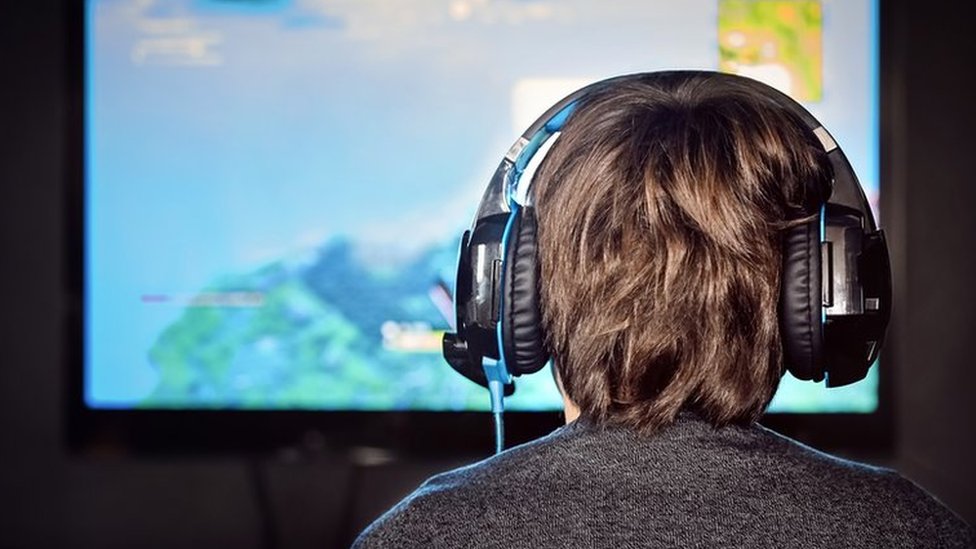“Combating Toxic Gaming: How Ubisoft’s Unique Police Alert System is Changing the Landscape”
player
Rape jokes, racism, bullying – if you’ve picked up a controller or scrolled your mouse to try your hand at online games, you’ve probably come across many.
The gambling industry, like others where people interact online, has been trying to figure out how to deal with such behavior for years.
Ubisoft, maker of big franchises like Assassin’s Creed and Rainbow Six, has now signed a unique deal with the police to try to address the problem for its players.
The hope is that this agreement will spark a conversation within the industry and others will follow suit.
cooperation with the police
Online gaming is a joyful experience for millions of people every day.
It is a place where friendships are made and unforgettable experiences shared. During the pandemic, online gaming has been a savior for many people’s mental health. But his dark side is also clearly visible. Abusive behavior, death threats and grooming – can be found in online gaming spaces.
“We want to be on the right side of history,” says Damien Glorieux, senior director of the Newcastle-based Ubisoft Customer Relationship Center.
Here and four other locations around the world, staff monitor how Ubisoft game players are doing, respond to requests for help, and actively engage in the communities that have grown around their titles. They deal with everything from purchasing issues to online toxicity.
Other companies have similar structures, but what is unique here is the involvement of local law enforcement.
The deal between the company and Northumbria Police consists of two parts.
Andy Millmoor (R) is the player experience director at centre. He says online toxicity can take many different forms
First, specialized officers share their knowledge and expertise on harmful online interactions with the 200-strong team working at the center in Newcastle, who then apply this training to their day-to-day work.
Secondly, there is an arrangement so that in extreme cases where there is a determination that there is a risk of death or potentially serious damage, the staff can quickly forward the information to the police.
They then decide whether to act or not.
Glorieux told BBC News: “We have millions of players and tens of millions of interactions – so how can we detect incidents?
“It’s daunting but at the same time very important, which is why we wanted to sign this deal and try to make things right.
“We wanted to focus on the most extreme cases and make sure we’re doing the right thing there because it gives us a solid foundation to build the rest of our work on.”
Less than 0.01% of the cases the center handles end up requiring police intervention.
That equates to about a handful of cases per month. Most often, accounts are temporarily suspended or permanently closed when players have violated a code of conduct.
Employees in Newcastle may also recommend that the company take legal action in some cases.
“life threat”
Andrew Holliday and his team deal with the cases that are approaching or reaching the threshold for police intervention: “This isn’t just a gaming problem, it’s an internet problem,” he begins.
“There is a real appetite to make the entire ecosystem a better place.
“What we work closely with the police on is triage, where we look at a case and we’re like, ‘Right, can we deal with this internally? Or do we have to pass this on? ‘”
Gambling is global and some of the instances seen by staff here cross national borders.
Holliday tells us about a recent case in Norway and says: “Things were said and behavior was shown that reached our intervention threshold. There was danger to life or serious damage.
“The arrangement with Northumbria Police meant that after we tagged it, even though it wasn’t a British citizen, they were able to involve the Norwegian authorities.
“It was much quicker, more efficient and safer than trying to do it privately.”
Ubisoft is famous for franchises like Rainbow 6 Siege, Assassin’s Creed and Just Dance
Some of the staff here argue that the gaming industry has shied away from talking about the reality of online gaming for too long. They say there needs to be a more open and proactive conversation about the steps being taken to address uncomfortable, dangerous or threatening behavior.
For Northumbria Police, Detective Chief Superintendent Deborah Alderson has led the work with Ubisoft on this agreement.
She argues that policing is about “prioritizing the protection of the vulnerable.”
“That means all of our communities, not just the ones we see in person, but also our online communities,” she adds.
“The police force is constantly changing, requirements are evolving and we constantly have different challenges – our job is to evolve with them.”
“Vital” work
Deborah Alderson, whose son is a huge Fortnite fan, believes work like this is vital as more of our lives go online and more people play.
She wants this arrangement to be emulated by gaming companies and other police forces across the UK and is working with police science professor Dr. Gavin Oxburgh of Northumbria University to provide a blueprint for how it can be copied by others.
The Newcastle center was established in 2014, initially as a call center to deal with player issues, but its role has evolved significantly since then.
The staff clearly care about their jobs and the arrangement with Northumbria Police has been in the pipeline for some time.
Andrew Holliday (L) explains that 0.01% of cases seen by center staff result in a police action
However, alongside the desire to start the conversation within the UK industry about tackling harmful online behavior, there is a compelling business reason to focus on customer relationships.
In an increasingly competitive market, getting people to play your games is harder than ever. They’re more likely to stay around when they feel safe and heard.
It’s been a rough couple of months for Ubisoft as games have been canceled and their financial forecasts scaled back. Keeping their player base happy is more important than ever.
Andy Millmoor is the player experience director at the center and says their number one goal is to make people feel “safe and secure” when it comes to behaving online.
“Toxicity takes many different forms,” he says.
“The most important thing for us is when you are at home trying to have a good time and relax – our aim is to make sure you do so in a safe environment.
“If someone wants entertainment, they have a whole range of things they can do, and if you’ve had a bad experience, if someone is giving you a bad time online, just go to one of the other options.”
Ubisoft isn’t alone, however, as the cost-of-living crisis is likely to hit more gaming companies in the coming months – it could be another reason why more people in the industry are interested in how this partnership is working and evolving.
No one working in this field expects a quick fix to a problem that’s plagued online life since its inception – but here’s a company trying to make gaming happy every time people click ‘Play’ press.
For more game content, see Press X to continue. the BBC Sounds gaming podcast.
Press X to continue the logo
Don’t miss interesting posts on Famousbio










